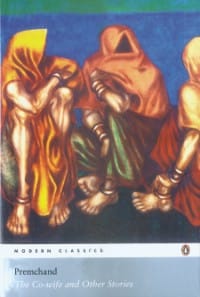Penguin Modern Classics : translations of Premchand's stories

One of the oft-told stories about Premchand, considered the greatest fiction writer in Hindi, is of a literary seminar organised in Patna. Premchand was to preside over it. He was to arrive a day before the seminar. A number of people came to the railway station to meet his train, but as it happened, none of them had met the author before. They only had a photograph to go by.
An express train arrived. They looked for him, but he wasn't there. The Punjab Mail arrived. They looked for him, but he wasn't there. With the seminar to be held the following day, there now remained only one more train. Which was now their last hope.
The train arrived, and having stopped, departed. Hundreds of people got on and off, but not Premchand. The organisers of the seminar were in a panic at the prospect of a Premchand-less seminar, which would have been a huge embarrassment. Disappointed and agitated, they now approached the waiting rooms. On the steps there, they saw a graying, middle-aged gentleman, looking a little lost and fed up with the discomfiture of travel, as the porter, carrying a trunk on his head and a bed-roll on his arm, asked him, "Which way, Sir?"
They had seen this passenger alight from the Punjab Mail the previous night, but had not recognized Premchand, a most unpretentious man. Five foot four inches, lean but broad-boned, with a quiet demeanour and simple habits.
The stories are like the author himself, unpretentious and simple on the surface. Beneath, of course, a social passion raged. In Premchand's stories, unlike the Urdu and Hindi stories and poems before him and which he had devoured as a child and in youth, there is no dalliance, no light fancies and arias, no sighs or dazzling word play. In a 1920 letter to his friend Imtiaz Ali 'Taj' (a well known Urdu writer in his own right) he had conveyed his literary ethos in easy terms: "I wish to see literature masculine, for I do not care for femininity in any of its manifestations. That is why I do not like the songs of Tagore. This must be some congenital fault, about which I can do little. The only verses which appeal to me are those which have an original insight. I am quite devoted to the flavour of Ghalib."
The above sentiment may have to do with the fact that he was born Dhanpat in a village near Benaras, grew up poor, and became an orphan early who at age fifteen had to shoulder the burden of supporting his family. He eventually became an inspector of schools, and in the fight against the British, became a pronounced Gandhian. And under the pen name of Premchand, wrote stories, as everybody knows, where social realism and social protest are dominant, especially against the oppression of women and those of lower castes, stories that exposed the horrors of rural poverty. Perhaps this is what he meant by a 'masculine style.' It is interesting to note that, as translator Ruth Vanita points out in her introduction here, that recently some Dalit critics have denounced Premchand "as casteist, largely because he depicts two Dalit men in (his famous story) 'The Shroud' as wastrels who oppress women." But they, she went on to note, "make the mistake of viewing only men as Dalits, thus rendering Dalit women invisible. This, of course, repeats the underlying assumption in male oppression of women, namely, that men are human and women a less important subgroup of humanity. The woman in 'The Shroud' is a hardworking victim, oppressed by the men of her family, and she too is a Dalit."
The above illustrates how easy it is to simply misread, or read too quickly, Premchand's stories, which are simple on the surface. It is a measure of his enduring popularity that, despite some writing of indifferent quality in a vast output with an astonishing range of plots, themes and genres, he continues to be read widely by succeeding generations of readers. Penguin India's Modern Classic series therefore continues to do its good work by bringing out the masters in the Indian vernacular languages in English translation, thereby making them available to the widest possible reading public. All the volumes in this series are attractively packaged, and the translations done with care and sensitivity.
Sadeeq Ahmed is a researcher and private consultant.

 For all latest news, follow The Daily Star's Google News channel.
For all latest news, follow The Daily Star's Google News channel. 



Comments